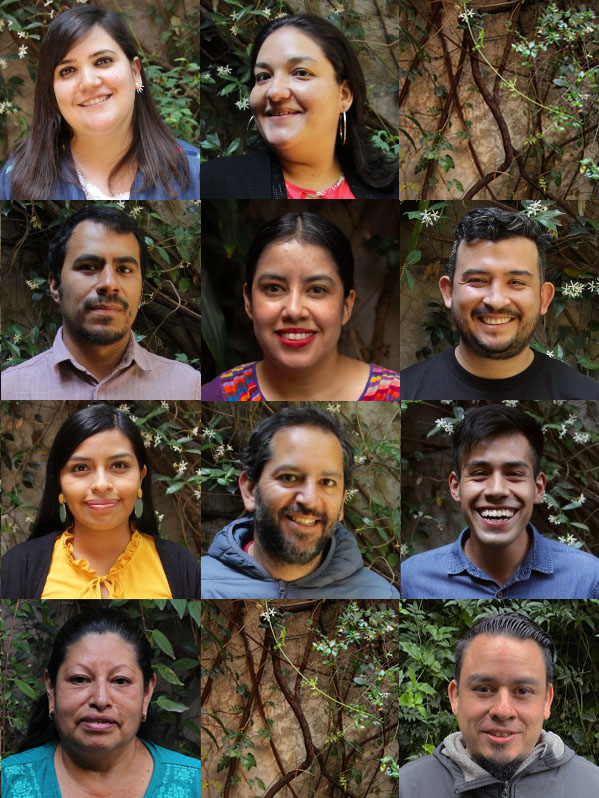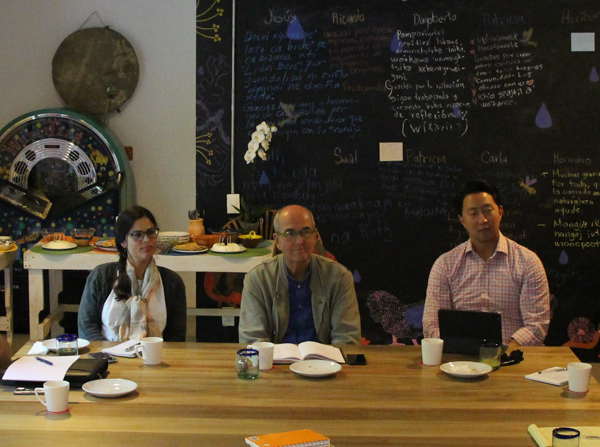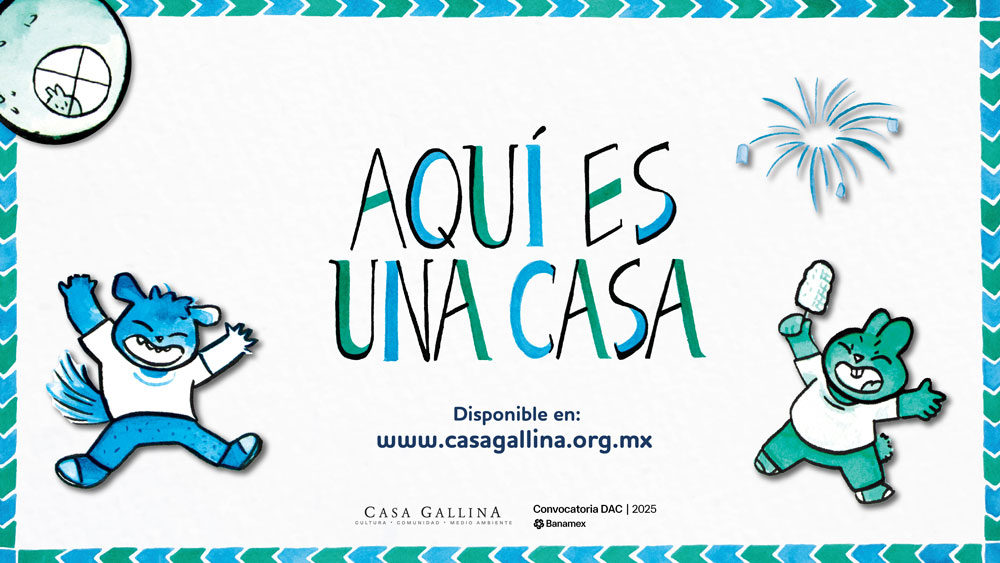Visitors and guests of Casa Gallina are welcomed to the community space as if they were coming to their own home. While the name "Casa Gallina" began as an internal reference by the organization's founders, the name speaks to the collaborative nature of its programming and the connection with nature in an urban environment.
Since 2019, Casa Gallina has expanded through strategic alliances with allied organizations throughout Mexico to activate new communities around environmental protection and cultural expression.
These allies include a network of community organizations, public and private institutions, and collectives in Aguascalientes, Campeche, Chiapas, Mexico City, Estado de México, Guerrero, Hidalgo, Jalisco, Michoacán, Morelos, Nayarit, Nuevo León, Oaxaca, Puebla, Querétaro, Quintana Roo, Sonora, Tabasco, Tlaxcala, Veracruz, and Yucatán.
Thousands of neighbors from the Santa María la Ribera community visit Casa Gallina each year, with programming designed for residents of all ages (0-90 years) to participate and enjoy. Casa Gallina's community spaces and programming are especially beneficial for low-income residents who would otherwise have difficulty accessing services such as the computer lab, library, and healthy cooking classes.
Beyond the physical center, the majority (65%) of Casa Gallina's program participants are young people under 20 years old. Casa Gallina ensures that future generations grow up with an intentional understanding of their impact on the world around them, focusing on leadership development and education. Casa Gallina's focus on preserving indigenous traditions is particularly relevant to indigenous communities facing common challenges in Mexican society.
+52 55 2630 2601
+52 55 6813 9568
info@casagallina.org.mx

Urbanization and population growth have also contributed to a series of social ills, such as excessive consumption, air pollution, social isolation among older adults, the loss of indigenous traditions and food insecurity, in addition to the overwhelming threat of the climate crisis.
Community-centered approaches are essential to address the interconnected problems of social isolation, loss of indigenous traditions and food insecurity, and to generate actions against the climate crisis. Fostering deeper connections with nature and access to urban green spaces can help slow the loss of biodiversity and help influence people's pro-environmental actions and beliefs, and generate actions against the climate crisis.
Casa Gallina's general objective is to foster strong connections with the natural world, as well as with indigenous cultures in order to promote environmental protection and cultural expression throughout Mexico. To achieve this objective, each Casa Gallina program creates collaborative experiences and dialogue through art that inspires people to take action to improve the world around them. Casa Gallina's diverse programs seek to achieve the following objectives:
- Foster empathy and understanding among neighbors through community events, programs and art exhibitions so they can collaborate to improve daily life and promote the common good.
- Train educators to integrate contextually relevant environmental perspectives into lesson plans to improve young people's critical thinking skills and bring students closer to information about nature and the environment.
- Operate an innovative laboratory to meet the needs of all community members, including youth, the elderly, and marginalized indigenous populations.
- Provide a methodological framework and promote environmental sustainability and foster social cohesion so that allied organizations can adapt and extend Casa Gallina's impact throughout the country to strengthen the social fabric.
Theory of Change
Our theory of change is based on the belief that fostering collaborative learning and interdisciplinary interactions among professionals from diverse fields leads to innovative solutions and positive social impact. Through facilitated dialogue, idea exchange, events, and interdisciplinary projects, Casa Gallina aims to create a dynamic environment that fosters creativity, problem-solving, and community engagement.
Community-Centered Methodologies
Community engagement and collaboration are fundamental to Casa Gallina's model. Our organization does not aim to be an "intellectual reference," but rather a connector and articulator of Mexico's rich network of active community leaders, change agents, and territory protectors. All of Casa Gallina's work is developed based on the specific needs of the communities served, through feedback and conversations with neighbors, partners, and participants through activities such as collective mapping. We are dedicated to working with others in all initiatives to create community, trust, and a collaborative environment.
We also measure the number of art exhibitions and murals produced, along with the number of visitors (in-person and virtual) at each exhibition. To track the success of publications, we record the number of books published and the percentage of books printed in indigenous languages. We also use qualitative and innovative metrics such as collective mapping, questionnaires, and pauting drawings where young people can share their honest opinions and learnings from the programs.
To measure the impact of programming at our center, we track the average number of attendees at Casa, including the number of participants in neighborhood meetings, farmer's markets, and agroecology classes, as well as additional metrics related to responsible consumption, such as the number of agroecological seed varieties collected, the production of fertile soil derived from compost, and neighborhood gardens linked to Casa Gallina's lessons. Community members participate in frequent surveys and provide testimonials about their experiences, and can leave comments at the center.


Casa Gallina was founded as a not-for-profit civil association and has the authorization of the Secretariat of the Treasury to receive tax-deductible donations. The Board of Directors responsible for Casa Gallina invests an important part of the project's operating finances, however the search for support and allies for the development and implementation of the programs remains key to the project. The search for new allies, associated funds, and platforms for developing collaborative projects are fundamental to the growth of our actions and their impacts.
Founding Patrons
Casa Gallina is grateful for the support of its founding patrons:
- Hans Schoepflin
Panta Rhea Fund - Aimée Labarrère de Servitje
Legal Advisory
Casa Gallina is grateful for the legal advisory of:
- Elias Calles Abogados
- Graue Abogados
- Cristian Valencia Riou
- Alejandra González Silva
Programs 2021/2022
For the development of 2021/2022 programs, we are grateful for the direct support of:
- SERVAX BLEU through EFIARTES (Tax incentive from article 190 of LISR)
- Crowdfunding Campaign: I Recreate the City through Donadora
- Collective Funding Campaign: Earth Nook on Donadora
Programs 2023
For the development of 2023 programs, we are grateful for the direct support of:
- XTRA Congelados Naturales SA de CV through EFIARTES (Tax incentive from article 190 of LISR)
Programs 2024
For the development of 2024 programs, we are grateful for the direct support of:
- Coppel Foundation through Kaleidoscope program
- Crowdfunding Campaign: Recreate
Programs 2025
For the development of 2025 programs, we are grateful for the direct support of:
- Programa de Desarrollo de Arte y Cultura Citibanamex (DAC)
- Casa Gallina 10 Years of Community Work
Join our cause!
Casa Gallina is a project built on a sum of wills. Your generous contribution helps us to continue building experiences which can contribute to strengthening the community and environment through culture and everyday life.






